Community in Camouflage
By Teagan Staudenmeier
In the heart of Tallinn, Estonia, almost a thousand miles from their homeland, Ukrainian refugees are supporting their countrymen on the frontline of the Russia-Ukraine war. In a windowless space in the T1 mall, they are knitting and cutting camouflage nets and helmet covers. They hope their handiwork will help shield Ukrainian soldiers from enemy fire.
Valentina Sudakova, a Ukrainian refugee living in Tallinn with her four daughters, joined the initiative last year. “We knit… we cut, and with each patch we send our warmth, the hope that this patch will protect a soldier from a bullet,” she said.
Jaana Ratas is one of the organizers of the initiative, called Aitan Kaitsta (Helping to Defend). Following the Russian invasion of Ukraine in February 2022, refugees poured into Estonia, a small Baltic nation that borders Russia. Estonia has accepted over 60,000 refugees, the largest per capita of any country in the European Union.
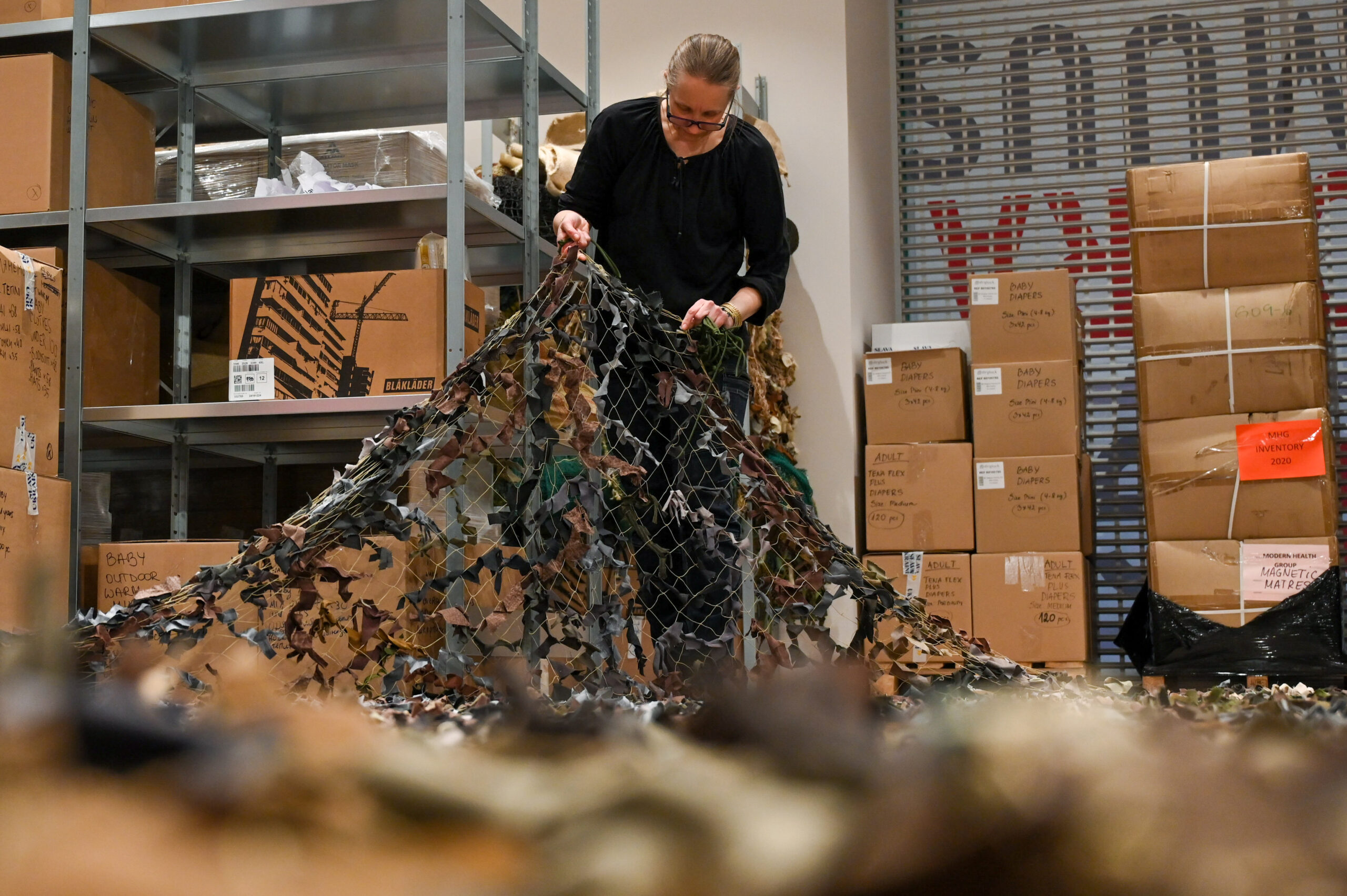
Many of the refugees were reeling from the dangers they had fled and from anxieties about their families still in Ukraine and their own uncertain futures. Ratas and other Estonian citizens searched for ways to help them. Aitan Kaitsta was their answer.
At the mall, the initiative has a dedicated space filled with donated fishing nets, spools of fabric and camouflage-colored clothing. Most of the volunteers who work here are women. Their time and labor is their proactive contribution to the war effort, and they say it gives them a connection to soldiers defending Ukraine.
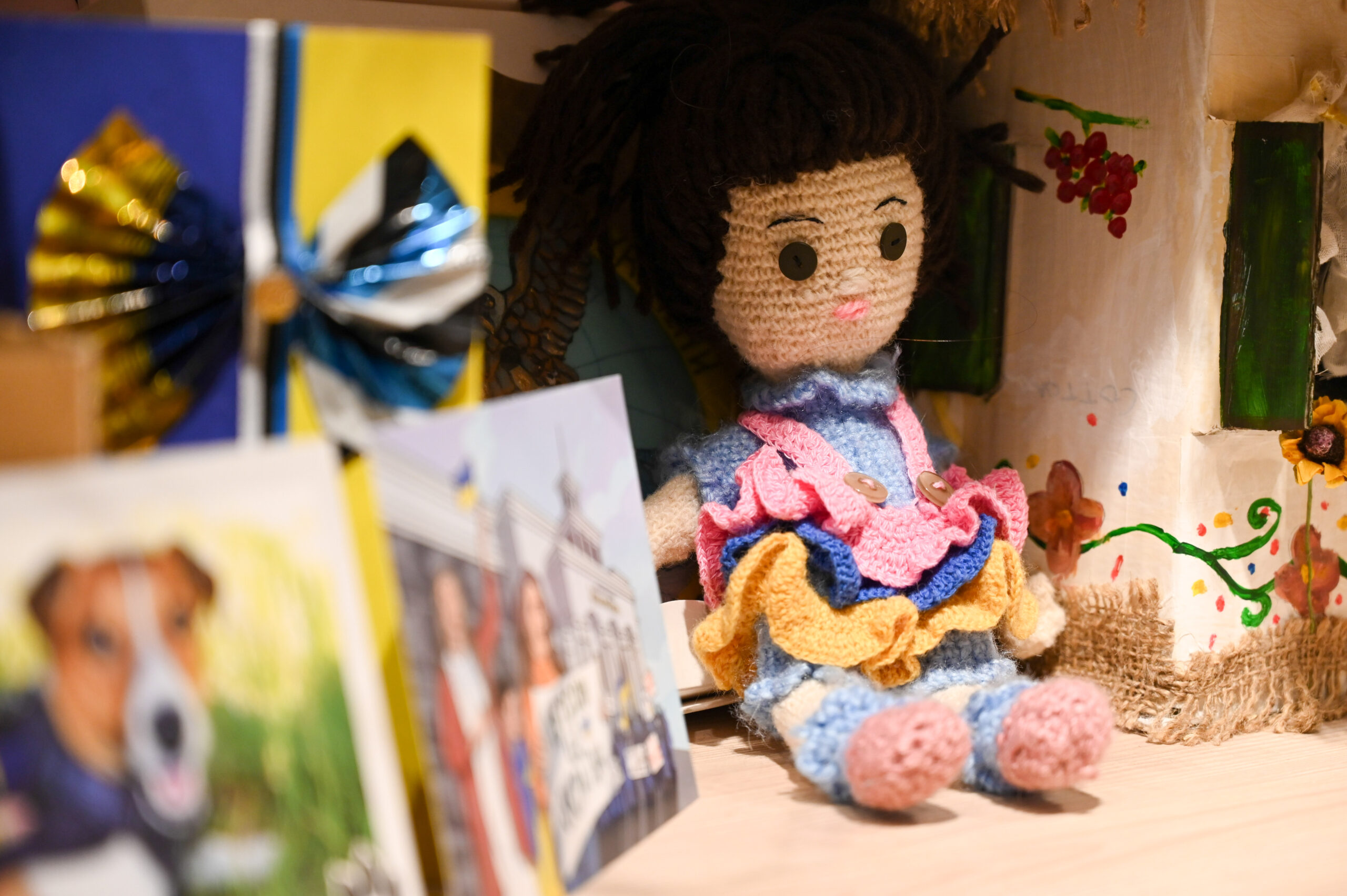
The community they have found at Aitan Kaitsa is a source of comfort during the turbulent times.
“It’s like a family here,” Ratas said.
And as at a family reunion, the volunteers have stories to share.
For 81-year-old Nina, Aitan Kaitsa has provided ways to cope with the stress of the war in her homeland. Although she had been retired in Ukraine, she had a country house, with a garden that she tended. Gardening was not just her hobby, she said, her garden was her “brainchild.”
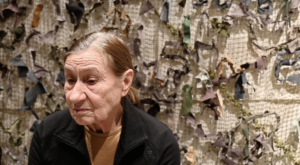
When the war began, her family encouraged her to move, first to Germany and then to Estonia to be close to her grandson who rented an apartment for her in Tallinn.
Once settled, Nina, who didn’t share her last name, soon became restless. She told her grandson she needed something to do “so that I wouldn’t fall apart. So, he found me this place where they knit camouflage nets, and I’m very glad that I am busy that I am being useful to our army,” she said.
Ukraine is always on Nina’s mind.
“We, of course, every evening watch the news. And that kills us. I can’t sleep after that, there are nights when I can’t sleep at all,” she said.
Nina has turned to writing poetry, something she had never done before the war. She sends her poems to her daughter who shares them on Facebook.
“Do you understand when I don’t sleep at night, I have this feeling coming over me, fury, anger at those fascists who attacked us — you understand? — and so it [poetry] pours out on its own,” Nina said.
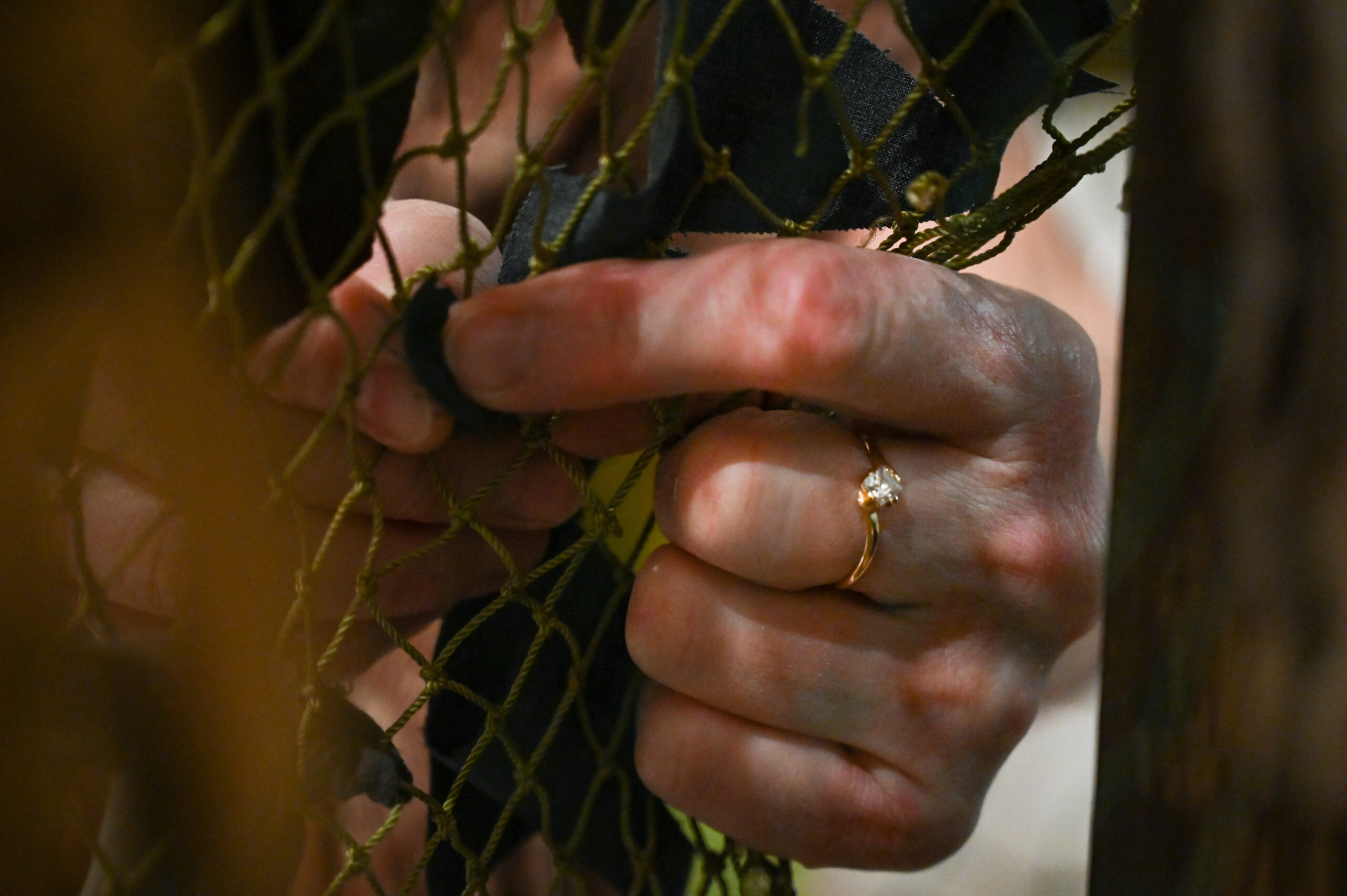
Despite the hardships, the worries and uncertainty, the refugees find solace in each other and in their faith. “… they come here, and they feel good,” Sudakova said.
Sudakova also finds comfort in her Ukrainian church community that has formed in Tallinn.
“People are looking for God, especially now when it’s so hard. They need something — not just salvation but that someone would understand, so they’re looking for God,” Sudakova said.
Sudakova has trusted God in many pivotal moments in her life. She said when they were hesitating to leave her home in Zaporizhzhia, she decided, “If God wants us out, we will make it.”
Three days later, she and her daughters were on a train that was evacuating Ukrainians from areas under Russian attack.
“I don’t know how we made it inside. We stood on the station platform and there was a sea of people — you might have seen photos in the news. So we stood in that sea of people. We thought there was no way we could make it into the train. The train stopped and the doors opened up right in front of us. And the crowd carried us inside.”
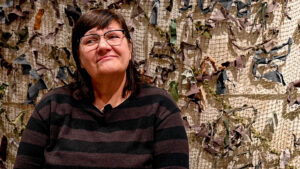
The wartime evacuation was not the first time Sudakova was uprooted from her home. In 1986 after the Chernobyl disaster, Sudakova was a liquidator, one of the civilian and military personnel mobilized by the Soviet government to deal with the consequences of the nuclear meltdown. They were widely credited with limiting the impact of the catastrophe.
When she was ultimately evacuated from Chernobyl, she was told she would never have kids because of her exposure. But she prayed, she said. And now she has four daughters in Estonia and a son back in Ukraine.
In spite of the war, Sudakova still wants to go back home. “Even though everything is still going on there. I need to be home. Everywhere is good but it’s better at home… I cannot root myself here, my roots are there,” she said.
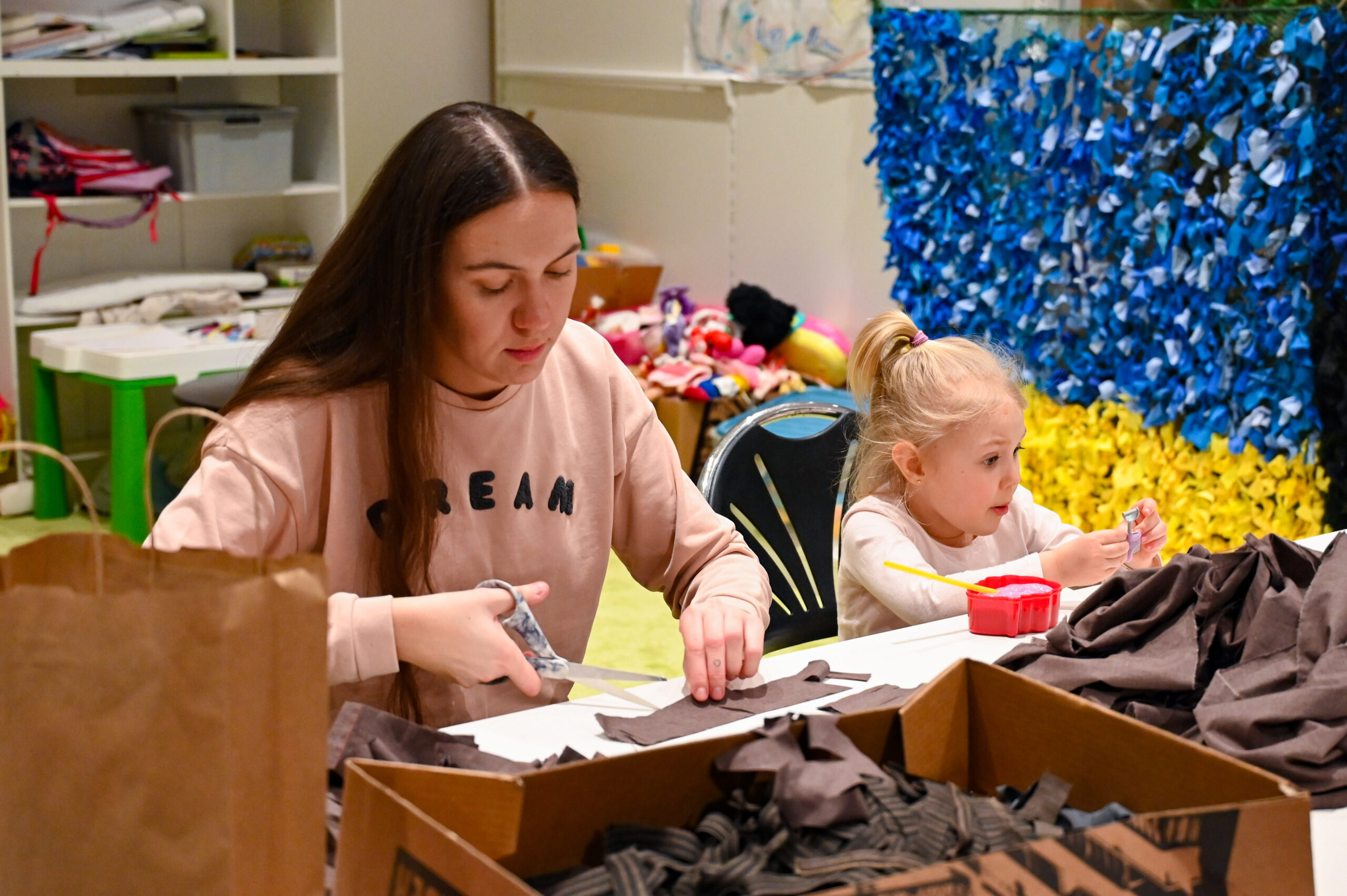
Sudakova is grateful to Estonia for what the country and the people have been doing for the Ukrainians.
“Estonians are wonderful people. Us, Ukrainians, they treat us very well, from government to regular people. They treat us with understanding, with respect, with a desire that we feel better,” Sudakova said.
“We have decided we won’t give up,” Ratas said, “It’s important.”
For Ratas, net-making is akin to group therapy bringing together refugees from all over Ukraine who bond over their shared grief while also contributing to their country’s defense from the safety of Estonia.
“When you start doing something with your hands, it pulls you out of the depressed state. People really are going to feel better. And considering our Ukrainian refugees, they all come from very different places. They didn’t know each other before that. This is the place where people come together and share all kinds of feelings and contacts,” Ratas said.





~Published on May 4, 2023